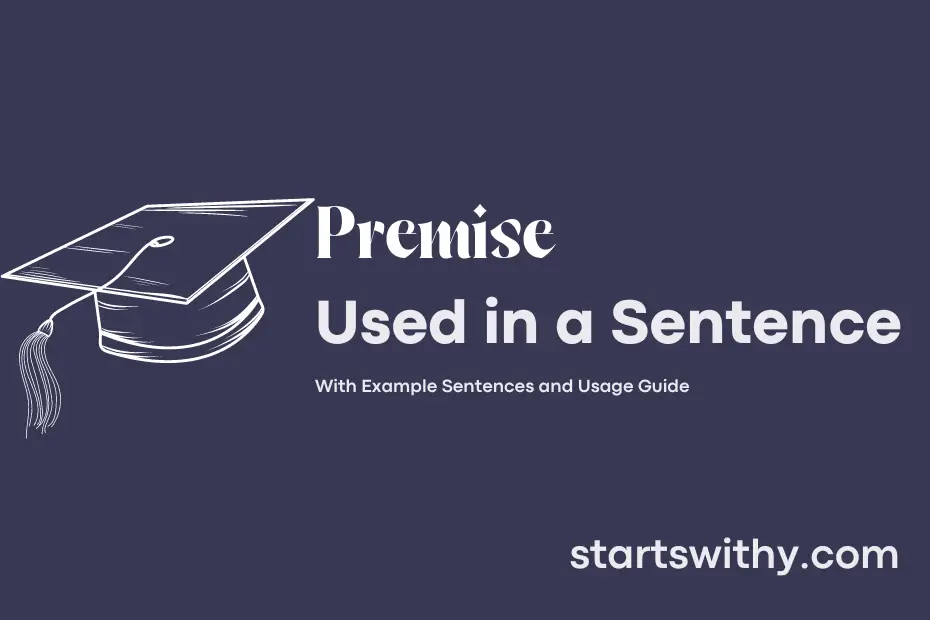If you’ve ever wondered what the term “premise” means in writing or storytelling, you’re in the right place. A premise is the foundation upon which a story, argument, or piece of writing is built. It’s essentially the central idea or concept that the rest of the work is based on.
In writing, the premise sets the stage for the plot or the main point you are trying to convey. It serves as the guiding principle that shapes the characters, conflicts, and ultimate message of the piece. Understanding the premise of a story or argument is key to grasping its overall meaning and impact.
7 Examples Of Premise Used In a Sentence For Kids
- The premise is where the story begins.
- The premise tells us what the story is about.
- We can think of the premise as the main idea of the story.
- Knowing the premise helps us understand the story better.
- The premise is like a clue that tells us what will happen next.
- When we know the premise, we can predict what might happen in the story.
- The premise is like a key that unlocks the meaning of the story.
14 Sentences with Premise Examples
- Premise: Before writing your essay, make sure to clearly identify the premise you want to argue.
- As a college student, it’s important to critically analyze the premise of the research articles you reference in your assignments.
- Understanding the premise of a mathematical theorem is crucial for solving complex equations in calculus.
- In a debate competition, being able to effectively defend your premise is key to persuading the judges.
- When forming study groups, it’s helpful to establish a clear premise for what topics will be covered during each session.
- As a science student, you must always question the premise of an experiment before drawing conclusions from the results.
- Premise: Before starting a group project, it’s important to establish a shared premise among all team members.
- During a literature analysis, it’s essential to identify the underlying premise of the novel before examining its themes.
- As a student leader, presenting a strong premise for your proposed initiatives can help gain support from your peers.
- In a philosophy class, students often debate the premise of ethical theories and their practical applications in society.
- Before conducting a survey for your sociology project, ensure that the premise of your research question is clear and concise.
- Premise: When organizing a campus event, defining the premise of the occasion can help attract a larger audience.
- As part of a psychology experiment, it is crucial to establish a premise that connects the variables being studied.
- Understanding the political premise behind different policies can help college students make informed decisions when voting in student elections.
How To Use Premise in Sentences?
Premise is an important word in writing, as it sets the foundation for your argument or story. When using Premise in a sentence, it is crucial to understand its meaning and how to incorporate it effectively.
Here are some tips on how to use Premise in a sentence as a beginner:
-
Identify the main idea: Before using Premise in a sentence, make sure you know what the main idea or argument of your writing is.
-
Introduce the premise: Begin your sentence with the word Premise followed by a brief statement of what the main idea is. For example, “The premise of the novel is that love conquers all obstacles.”
-
Support with evidence: After stating the premise, provide evidence or examples to support it. This will help strengthen your argument and make your writing more persuasive.
-
Connect to the conclusion: The premise sets the stage for the conclusion of your argument or story. Make sure there is a clear connection between the premise and the end point of your writing.
-
Avoid repetition: While the premise is important, try not to overuse the word in your writing. Use synonyms or rephrase your sentences to avoid repetition.
By following these tips, you can effectively use Premise in a sentence and improve the clarity and impact of your writing.
Conclusion
In conclusion, sentences with a premise play a crucial role in forming the foundations of arguments and logical reasoning. A premise acts as the starting point of an argument, providing the necessary background or information for the conclusion that follows. It sets the stage for a clear and structured flow of thought, helping readers or listeners to follow the logic of the argument being presented.
By using sentences with a clear premise, individuals can effectively communicate their ideas and persuade others towards a particular conclusion. These sentences are essential for building a strong and coherent argument, as they provide the context and support needed to lead to a logical and convincing outcome. Mastering the art of constructing sentences with a premise is key to developing critical thinking skills and engaging in meaningful discussions.



